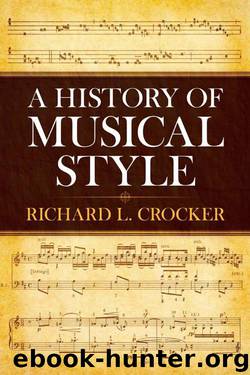A History of Musical Style (Dover Books on Music) by Richard L. Crocker

Author:Richard L. Crocker [Crocker, Richard L.]
Language: eng
Format: epub
Publisher: Dover Publications
Published: 2014-05-05T03:00:00+00:00
North of the Alps
PURCELL AND ENGLISH MUSIC
While England was without a Schütz for most of the century, she finally found one in Henry Purcell (1659–1695). Shortly before his untimely death, Purcell published a revealing assessment of British music in the dedication of his music for the Prophetess, or the History of Dioclesian (1690/1691):
Poetry and Painting have arrived to their perfection in our own country: Music is yet but in its Nonage. . . . ’Tis now learning Italian, which is its best Master, and studying a little of the French Air to give it somewhat more of Gayety and Fashion. Thus being farther from the Sun, we are of later Growth than our Neighbour Countries, and must be content to shake off our Barbarity by degrees.
A sustained effort to “shake off Barbarity” can be traced from 1650, beginning with the publishing activities of John Playford, for example, his Introduction to the Skill of Musick (1654) and Select musicall Ayres and Dialogues (1652). There was an attempt at full-scale English opera: in 1656 William D’Avenant produced the Siege of Rhodes, with music by Henry Lawes (1596–1662), Henry Cooke (ca 1616–1672), and Matthew Locke (1630–1677). After 1660 there was a steadily increasing demand in England for Italian music, but in spite of the enthusiasm with which the Italian style was received, no British composer seemed willing or able to produce an indigenous version of that style in any significant quantity.
This was all the more surprising since the British seem to have had a very clear understanding of the spirit of Venetian opera in terms of their own literary drama. Although not shared by all playwrights and audiences, this understanding emerges especially in the heroic verse dramas of John Dryden (1631–1700). Dryden conceived drama as “nature wrought up to a higher pitch,” and justified on that basis the use of artificial devices such as rhyme. This elevation of lyrical dialog through extravagant poetic diction is the same concept that lies behind recitative. Perhaps because this dramatic concept was identified in England with spoken drama, it was never accepted in opera; at any rate, in England the most successful operatic projects of the 1600s involved a combination of Italian arias and spoken drama. Drama sung from beginning to end in English was infrequent. During the 1680s there appeared Venus and Adonis by John Blow (1649–1708) and Purcell’s Dido and Aeneas, but these are exquisite miniatures, cast in the dimensions of the early favola pastorale even though they use more modern techniques.
The composition of English music had as its point of departure after 1660 the Chapel Royal, where the “brisk and airy Prince,” Charles II, caused the modern Italian style to be well represented. The Chapel flourished under the leadership of Henry Cooke: “Captain Cooke’s boys”—John Blow, Matthew Locke, and Pelham Humfrey (1647–1674)—came to represent up-to-date British music. Purcell’s concerted church music, written largely during his twenties, belongs in this same sphere of activity. Up to the end of his life Purcell also wrote a great deal of occasional music in modern vocal style, including the celebrated Odes for St.
Download
This site does not store any files on its server. We only index and link to content provided by other sites. Please contact the content providers to delete copyright contents if any and email us, we'll remove relevant links or contents immediately.
The Goal (Off-Campus #4) by Elle Kennedy(13644)
Kathy Andrews Collection by Kathy Andrews(11798)
Diary of a Player by Brad Paisley(7542)
What Does This Button Do? by Bruce Dickinson(6190)
Assassin’s Fate by Robin Hobb(6190)
Big Little Lies by Liane Moriarty(5776)
Altered Sensations by David Pantalony(5090)
Pale Blue Dot by Carl Sagan(4988)
Sticky Fingers by Joe Hagan(4179)
The Death of the Heart by Elizabeth Bowen(3599)
The Heroin Diaries by Nikki Sixx(3537)
Beneath These Shadows by Meghan March(3294)
Confessions of a Video Vixen by Karrine Steffans(3292)
How Music Works by David Byrne(3250)
The Help by Kathryn Stockett(3131)
Jam by Jam (epub)(3069)
Harry Potter 4 - Harry Potter and The Goblet of Fire by J.K.Rowling(3050)
Computational Linguistics and Intelligent Text Processing: 20th International Conference, CICLing 2019 La Rochelle, France, April 7â13, 2019 Revised Selected Papers, Part I by Alexander Gelbukh(2976)
Strange Fascination: David Bowie: The Definitive Story by David Buckley(2849)
